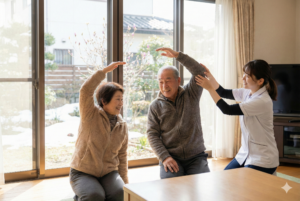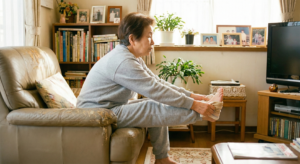The barrier of "refusal to see a doctor" for elderly people with dementia
Dad, let's go to the hospital." "No, I'm fine, I'm fine.
It is not uncommon for family members supporting an elderly person with dementia to strongly refuse to encourage the person to see a doctor. Even though they know in their heads that it would be safer for the person to see a doctor, the continued refusal can be exhausting for the family, and they may feel trapped, saying they do not know what to do.
However,There are reasons for refusal to see a doctor, and sometimes family members can remedy the situation through creative efforts.This article provides background information on the reluctance of elderly people with dementia to see a doctor, tips for solving this problem, and consultation services you can rely on.
Why are elderly people with dementia reluctant to see a doctor?
Although the symptoms of dementia vary from person to person, the following factors contribute to the refusal to see a doctor
- Anxiety and fear
Sometimes people feel "scared" or "don't want to go" to the hospital itself. Anxiety about waiting time and examinations are also major reasons. - Decreased memory and understanding
They forget "why we are going to the hospital" and resist when they are about to be taken there without being convinced. - Low self-esteem
The feeling of "I don't want them to think I'm sick" or "I'm still okay" can lead to the behavior of refusal. - Physical fatigue and pain
They may express that they "don't want to go" because the burden of long waiting times and travel is too much for them.
Innovations and solutions that families can make
So, how should we deal with refusal to see a doctor? The important thing is not to try to force them to see a doctor. Try the following suggestions.
- Be creative in the way you say things.
Instead of "Let's go to the hospital," try rephrasing it in a way that the person can easily accept, such as "Let's go see the doctor" or "Let's have your body looked at and feel relieved. - Communicate your plans last minute.
Telling them in advance may increase their anxiety. Sometimes it is smoother to say, "Let's go out for a bit" just before departure on the day of the event. - Have someone you trust accompany you.
In some cases, grandchildren, friends, and care managers are more readily accepted than family members. - Choosing a Hospital
Choosing a clinic that understands dementia and an outpatient clinic with a low waiting time can also be effective. - Using Home Visits
Home-visit treatment, in which a doctor comes to the patient's home, is suitable for elderly patients who strongly refuse to see a doctor, because it reduces the burden of transportation.
Sometimes it is best not to force a medical examination.
Of course, a sudden, life-threatening illness requires an emergency visit, but if the symptoms are chronic, it may be better not to force the patient to go to the hospital. However, if the symptoms are chronic, it may be better not to force the patient to go to the hospital. The important thing is to "stay close to the person while keeping him or her safe.
Contact for consultation
Before you go it alone, try using a professional consultation service.
- family physician (doctor)
First, consult your regular doctor. They may be able to offer specific suggestions, such as home visits or medication adjustments. - Community Comprehensive Support Center
A comprehensive consultation service for nursing and medical care. They provide advice on medical examinations and referrals to nursing care services. - care manager
If you are certified as needing long-term care, the care manager is responsible for coordinating your visits and use of services. - Dementia Disease Medical Center
They are located in each region and provide specialized medical care and consultation support for dementia.
A support system for families to feel secure.
Refusal to see an elderly person with dementia is a challenge faced by many families.The important thing is not to assume that the family can handle the situation alone.There is a support system in place in the community, and medical and nursing professionals will work with you.
weTaiseikai GroupBut we have a "seamless support system" through hospitals, nursing homes, and home services. We have received many consultations from families suffering from refusal to see a doctor, and we have received comments such as "I feel relieved after using the home-visit service" and "Using the day service has facilitated my visits to the hospital.
If you are in trouble, first consult with a local comprehensive support center or a corporation like ours that provides medical and nursing care services. The first step to a solution is to connect with people who can support you, and not to keep it to yourself.
summary
Refusal to see a doctor in an elderly person with dementia is a natural reaction born of the person's anxiety and confusion.
"Language," "use of home visits," and "use of consultation services."The burden on the family can be greatly reduced by knowing the options available to them.
Let's support the family in receiving medical examinations in a "no-pressure, close-by" manner while utilizing community support so that the family can continue to care for the patient with peace of mind.
\ Please feel free to contact us if you have any problems /.
Medical Corporation Taiseikai Uchida Hospital Community Medical Cooperation Office
(TEL) 0278-24-5329
Uchida Home Care Office
(TEL) 0278-23-7535









